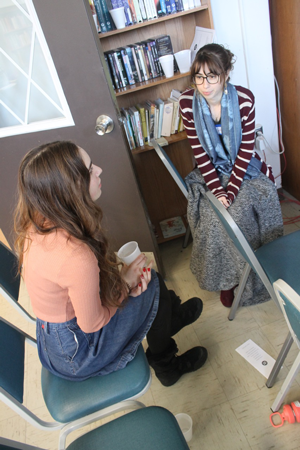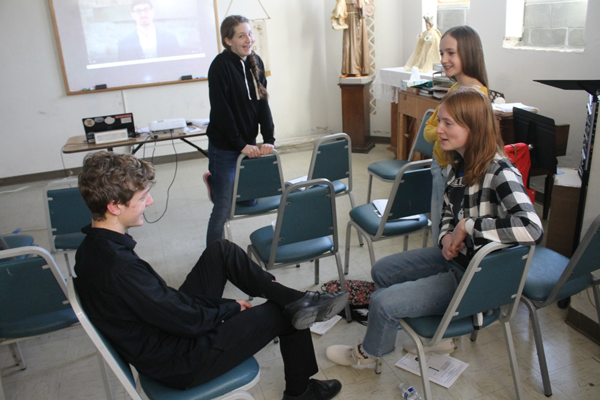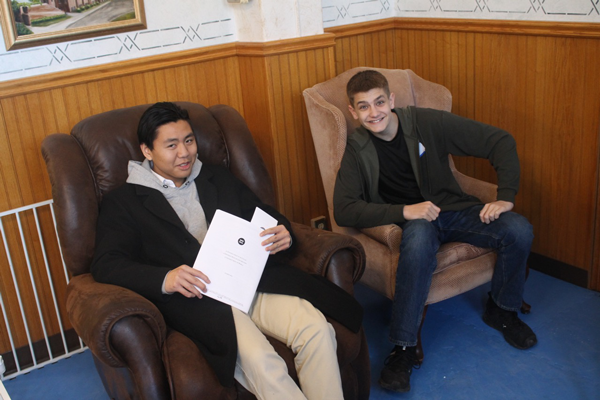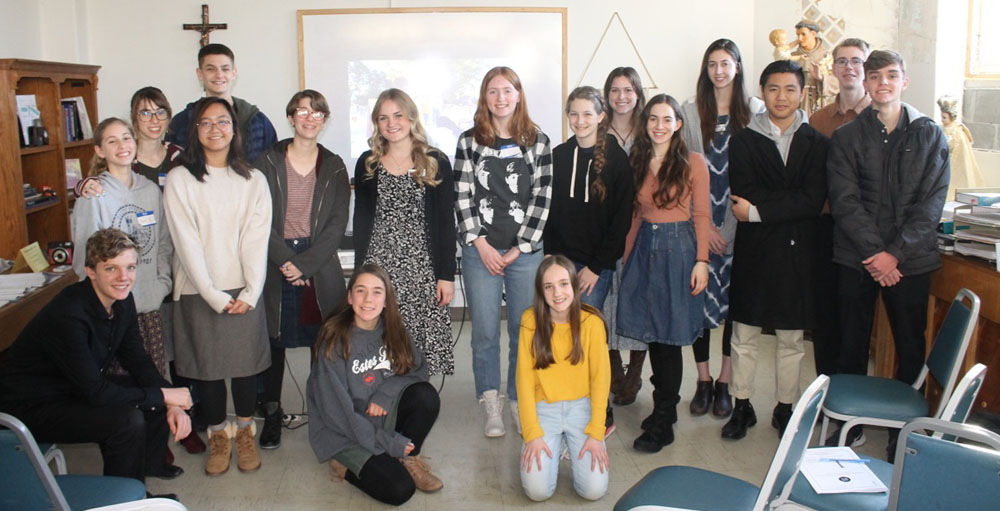By Ronald W. Lawson
Fourteen teenagers spent last Saturday learning how to take a conversation about abortion from debate to dialogue. They attended an all-day workshop offered by Justice for All (“JFA”), a non-profit organization whose goal is to “train thousands to make abortion unthinkable for millions, one person at a time.” Mary St. Hilaire, a native Nebraskan and full time Training Specialist with JFA, led the workshop with help from two JFA interns, Bella O’Neill and Kristina Massa, both hailing from California. The training was hosted at St. Francis of Assisi Catholic Church in Lincoln.
 The five boys and nine girls in attendance learned how to handle what can be an uncomfortable or unproductive conversation, often shedding more heat than light. Emma, a homeschooled junior, observed, “I think we often underestimate how difficult it can be to engage in a pro-life conversation. The training focused on how to start a conversation and make sure that it continues as a beneficial one.”
The five boys and nine girls in attendance learned how to handle what can be an uncomfortable or unproductive conversation, often shedding more heat than light. Emma, a homeschooled junior, observed, “I think we often underestimate how difficult it can be to engage in a pro-life conversation. The training focused on how to start a conversation and make sure that it continues as a beneficial one.”
While there are no magic bullets to sharing one’s views on this nationally divisive topic, learning to find some common ground is often the starting point, according to JFA trainers. Carefully listening and thoughtfully asking questions, they said, as well as avoiding the assumption that a person knows what someone else thinks, can help find this common ground. The students were introduced to a variety of arguments that are often made to justify or defend abortion, and they learned how to respond to them with both head and heart.
Understanding the arguments about when life begins and what defines a human being is often critical to having a discussion about the reality of abortion, JFA trainers said.
Sometimes the discussion revolves around “hard questions,” such as rape, life of the mother, birth defects and ectopic pregnancy. And attendees said they learned there are good answers and approaches to discussing even these exceptional situations.
 Dominic, a 14-year-old participant, said, “They broke down the hard cases… They told you first to talk about it with a bunch of sympathy for the person. You want them to know they’re hurt and are understood. At the beginning [of the workshop], they show a conversation with a lady who was pregnant at 13 and had an abortion… [O]bviously, her decision was wrong, but they didn’t sound sympathetic at all. They went into all these different facts, instead of asking how she was, if she’s okay, how they could help.”
Dominic, a 14-year-old participant, said, “They broke down the hard cases… They told you first to talk about it with a bunch of sympathy for the person. You want them to know they’re hurt and are understood. At the beginning [of the workshop], they show a conversation with a lady who was pregnant at 13 and had an abortion… [O]bviously, her decision was wrong, but they didn’t sound sympathetic at all. They went into all these different facts, instead of asking how she was, if she’s okay, how they could help.”
JFA, in addition to trainings like Saturday’s, specializes in college campus outreach. The presenters shared some powerful stories about the kinds of conversations they have had with students who hold many different viewpoints.
Miss St. Hilaire, in a recent article, wrote: “In conversing with people from various races, religions, states and even countries, getting to know them on a personal level, sharing my beliefs with them, and searching for the truth along side of them, I have come to realize that my love does not have to be limited to only those with whom I share the same views. I knew this in my head, but, until I actually participated in outreach with Justice For All, I didn’t know it in my heart.”
Toward the end of the workshop, participants were asked to pair up and take turns role-playing a conversation, with one professing pro-abortion views and the other pro-life positions. For some, it was an eye-opening exercise, and it was a chance to practice the three essential skills JFA teaches:
- Ask Questions with an Open Heart
- Listen to Understand
- Find Common Ground when Possible
 The students discovered that a conversation often doesn’t end with the other person dramatically changing his position on abortion. But seeds are planted and may take time to grow. Individuals often have surprisingly nuanced views on abortion. Many have never really taken the time to express or think deeply about what they actually believe, or why they hold the position they do. All too often, abortion supporters’ misconceptions about “pro-lifers” prevent them from understanding that those who oppose abortion really do care about the reasons why abortion supporters think the practice should be allowed. Once the misunderstandings are cleared up, it is possible to show that there are real and compassionate alternatives to killing an unborn human being. Meredith, another high school age participant, summed up her experience in this way: “For the first time I feel like I can have an effective conversation on a controversial topic.”
The students discovered that a conversation often doesn’t end with the other person dramatically changing his position on abortion. But seeds are planted and may take time to grow. Individuals often have surprisingly nuanced views on abortion. Many have never really taken the time to express or think deeply about what they actually believe, or why they hold the position they do. All too often, abortion supporters’ misconceptions about “pro-lifers” prevent them from understanding that those who oppose abortion really do care about the reasons why abortion supporters think the practice should be allowed. Once the misunderstandings are cleared up, it is possible to show that there are real and compassionate alternatives to killing an unborn human being. Meredith, another high school age participant, summed up her experience in this way: “For the first time I feel like I can have an effective conversation on a controversial topic.”
Looking back on the workshop, siblings Hop and Eve agreed that the experience “gave them confidence and knowledge about how to dialogue constructively with someone who is pro-abortion.”
Miss St. Hilaire, reflecting on the training, responded with these thoughts: “Training people, but especially teenagers, to have productive conversations about abortion is one of the best parts of my job with Justice For All, and our seminar at St. Francis was no exception. All the students seemed to be very engaged and receptive to the material, and I really enjoyed seeing them learn and grow in their dialoguing skills. It is always an encouragement to see that there are young people who are willing to get out of their comfort zone in order to educate others on the reality of abortion and bring an end to this injustice.”
JFA currently has 11 full-time missionaries who travel throughout the country to conduct trainings and campus outreach. In addition, several staff members either work from home or support the missionaries from JFA headquarters in Wichita, Kansas.
Speaking of the challenges and blessings faced and received by the full-time traveling staff, Miss St. Hilaire commented, “We each have our own ‘team’ of donors that supports our work. Several of us, myself included, are still working to raise full support. People can donate to a specific staff member, our interns, or the organization on our website at jfaweb.org/donate.”
JFA teams visit approximately 15 college campuses and conduct about 50 trainings each year. In response to the “pandemic” restrictions on in-person events, JFA also offers a free online training series called “Love 3.”




